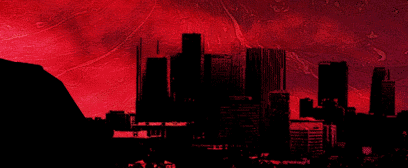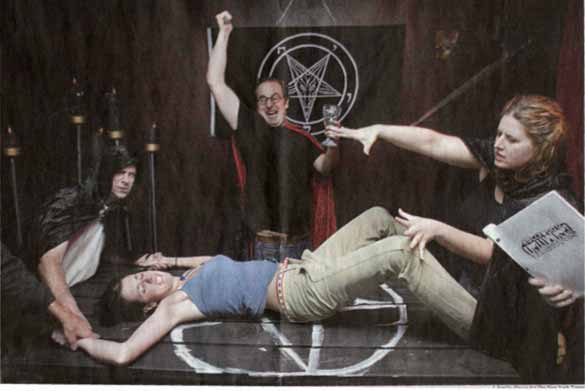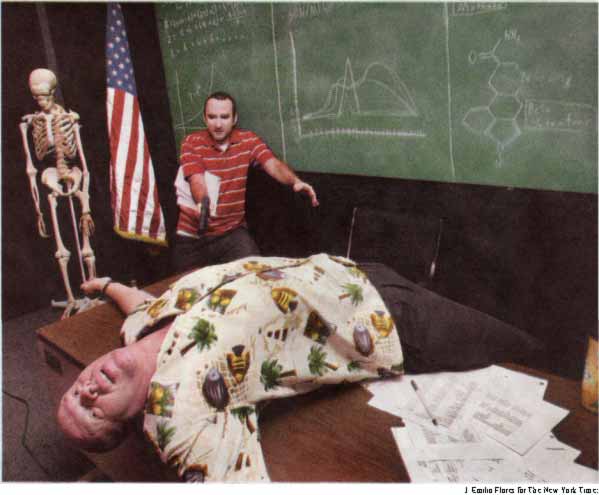


A Pastor-Inspired Project That's Anything but Evangelical

Rehearsing a human sacrifice scene for
the Hollywood
Hell House, from left Bill Rutkoski, Jeannie Cole, Amit Itelman and Jaclyn
La Fer.
By RICHARD RUSHFIELD
LOS ANGELES
MAGGIE ROWE is blocking the abortion scene. Lying on the operating table,
the comedian Sarah Silverman, in the role of the Abortion Girl, props
herself up to receive notes. "When they hold the fetus up,"
Ms. Rowe instructs, "you really need to look at it and then scream,
"That's my baby!1"
For Ms. Rowe, 30, a Los Angeles actress, comedy writer and Zen Buddhist
who fled her Illinois fundamentalist Christian roots, a graphic anti-abortion
drama is the last thing she pictured herself staging in Hollywood. But
beginning last night and running every Saturday night through Halloween,
Ms. Rowe and her band of comedians, actors, special-effects artists and
sound engineers - including Ms. Silverman, the comedian David Cross, the
actor Richard Belzer, the television host Bill Maher and the former pornography
actress Traci Lords - are taking over the Steve Alien Theater on Hollywood
Boulevard and converting it, and the two-story office building around
it, into a "Hell House."
Or a parody of one. An evangelical Christian take on walk-through haunted
houses, Hell Houses replace ghosts and goblins with graphic depictions
of young people surrendering to sin and then being tortured in hell for
their transgressions. Audiences, led by a demonlike guide, witness scenes
played out in unrelenting Grand Guignol fashion, depicting homosexuality,
drunken driving and teenage suicide. According to a Hell House "outreach
kit" compiled by Keenan Roberts, an Assembly of God minister in Broomfield,
Colo., the scenes demonstrate: "The hell and destruction that Satan
can bestow upon those who choose not to serve Jesus Christ. Literally,
Hell House depicts choices that have the end result of ushering people
into hell."
Ms. Rowe got the idea of spoofing Hell Houses after she saw a documentary
about them. The 2001 film "Hell House," directed by George Ratliff,
is about the annual production in Cedar Hills, Tex., one of the country's
largest. She was captivated by what seemed to her the outlandish dramatic
extremes of the tableaus, and she recalls telling a friend, Jill Soloway,
who is now producing the Hell House in Hollywood with her: "We have
to do this. This is the best crystallization of the evils of fundamentalism.
We couldn't parody them any better." If protesters descend on the
theater, Ms. Rowe said: "My answer to them will be: 'We are doing
your own script exactly. To the letter.'"

Rehearsing a human sacrifice scene for the Hollywood Hell House, from left Bill Rutkoski, Jeannie Cole, Amit Itelman and Jaclyn La Fer.
Hell Houses have become popular seasonal displays in recent years mainly
because of the kits that Mr. Roberts writes and sells for $200 each. Detailing
everything from media relations to the construction of Satan's cape, the
kits provide scripts for the seven basic scenes that make up the Hell
House repertory. Mr. Roberts says he has sold more than 500 kits since
1995, the year after he began making them. Perhaps the earliest notable
Hell House was the one created in 1972 in Lynchburg, Va. Known as the
ScareMare, it is sponsored by the local Liberty University, which was
founded by the Rev. Jerry Falwell, its chancellor and the founder of the
Moral Majority.
Mr. Roberts, 39, the pastor of the currently homeless Destiny Church
of Assemblies of God in Broomfield, which he started, created his own
"spiritually flammable" Hell House program. His scene of a funeral
for an AIDS victim in which the tour guide mocks the deceased, and the
graphic and bloody abortion scenario, have drawn protests and media attention
in the past. In 1999, Mr. Roberts canceled a "school shooting"
scene after the Columbine High School shootings took place not far from
his Denver-area church. Ms. Rowe, however, has used a portion of the script
from the documentary, which did depict a school shooting scene.
In a telephone interview, Mr. Roberts explained the heightened rhetoric
of his creation: "If your house was on fire, you would not want me
to walk very casually up to the front door and ring the doorbell. You
would want me running in there, sounding every alarm I can possibly sound."
In order to buy a copy of Mr. Roberts's kit, Ms. Rowe posed as the director
of a West Hollywood youth group. "I never lied," she said. "But
I had to carefully choose my words."
Mr. Roberts takes a more stringent view of the conversation: "If
you don't tell me the whole truth, you haven't told me the truth. I feel
like it's a shame that there wasn't integrity and character involved in
the beginning of my connection with equipping these people with the ability
to do Hell House."
Ms. Rowe was able to persuade Mr. Roberts that she was a kindred spirit,
she said, through her facility with the language of evangelical Christianity,
something she learned as a child in evangelical schools and Christian
youth groups. The experiences, she added, left her embittered enough to
feel compelled to mock the belief system on a grand scale.
"One of the biggest problems of my life is my fear of hell,"
she said, recalling the adolescent nightmares that she said had alienated
her from evangelical teachings. Asked how she felt about making light
of issues that for many are crucial to their faith, she replied: "If
you really believe that all this is true, I don't know how you function
as a human being. If thaf s really the way the world is, really so abysmal
and disgusting, I can't understand who could believe that and still function."
Mistrust of conservative evangelical teachings seems to be a unifier among
those associated with Ms. Rowe's project. The theater's building on Hollywood
Boulevard also serves as the headquarters for the Center for Inquiry-West,
a secular-humanist "community organization for free thinkers and
skeptics," according to Jim Underdown, its executive director, who
rented his facility to Ms. Rowe's group. "We're critical of the religious
right," he said. "And a lot of people don't know what they're
really up to. This is a great way to show people how far from the mainstream
is what the religious right is doing."
A recent rehearsal of Hollywood Hell House opened with a group seated
on the floor in a circle, recounting their religious backgrounds. While
several people acknowledged being actively religious - two were churchgoing
Roman Catholics and several were practicing Jews - almost all spoke of
their hostility to what they see as extreme forms of faith, particularly
of the American Protestant variety.
Mr. Maher, who identified himself through a spokesman as a lapsed Catholic,
will appear in the role of Satan. In a telephone interview he described
his reasons for signing on to the production: "I'm excited that they're
doing the show just like they really do it. Where in many parts of the
country it's greeted with reverence, here it will be greeted as it should
be, with derision and laughter. Especially during this election season,
when we are so divided.
"I don't agree with these columns that say, 'Oh, pooh-pooh, only
the pundits are divided.' No, the country is divided. People do think
very differently, and this is a good example of exactly how differently
people think."
Ms. Rowe's vision of a deadpan staging of an evangelical Christian spectacle
has caught fire in the Hollywood comedy community. The cast and crew now
number more than 200 and the performers will appear as Satanic priestesses,
rapists, drug addicts and Jesus himself (to be played by the actor Andy
Richter). Special-effects experts have transformed the Center for Inquiry
into a hellscape that includes "flesh-colored stalagmites, an evil
dentist and dental assistant torturing a patient, a lot of dry ice, fog
machines and a rock 'n' roll demon bursting people's eardrums," said
Amit Itelman, one of the producers. Win Meyerson, the music coordinator,
said he had recorded a soundtrack of "sounds that are tuned down
many octaves below their natural level, crackling fire, backward voices,
backward drum loop - a lot of backwards."
Despite the anti-fundamentalist perspective the Hollywood actors bring
to the production, it is critical to Ms. Rowe's vision that the scenes
stay faithful to the original scripts, compiled from Mr. Roberts's kit
and the Ratliff documentary. Ms. Rowe recalled an early quarrel when the
special-effects crew wanted to construct "a penis monster" to
torment the gay sinners in the hell scene. "We felt as soon as we
do that, we're doing a whole other thing," she said. "They would
never show a fake penis. All of a sudden, we'd be on a whole different
track."
For Ms. Soloway, a writer on HBO's "Six Feet Under" who won
acclaim with a 1993 dramatic restaging of episodes of "The Brady
Bunch," an entirely faithful reproduction was, in itself, the dramatic
exercise. "My interest was in the formalism of the concept,"
she said, "taking something and putting it in a different context,
changing its meaning." The team's quest for fidelity to the original
includes instructions to cast members to spend the day of each performance
in character as Christian youth group members who have been cast in their
local Hell House. "Think about who that person is," Ms. Soloway
told the cast at a rehearsal. "Internalize someone who doesn't have
their lines memorized, is nervous to be onstage. Come in character. Stay
in character."
Although he said he felt he was deceived, Mr. Roberts described himself
as optimistic about the project: "If they present the homosexual
AIDS funeral the way it was written, they're going to present the message
that homosexuality is a sin."
He cited "an old joke, about a Christian who doesn't have any food
for his family and he prays to God to send him food."
"His neighbor hates Christians," he went on, "and hears
him praying and says, "I'll show him,' and goes to the store to buy
some groceries. Bringing them to the Christian he says,' See, God didn't
bring you this, I did.' 'No,' says the Christian, "God did send them,
he just had the devil deliver them.'"
While Mr. Roberts said he was optimistic that the production could win
converts in Hollywood, Mr. Maher called that hope "wishful thinking."
"Has he been to Hollywood lately?" Mr. Maher asked.
Richard Rushfield is the editor ofL.A. Innuendo, a satirical quarterly
about local culture.
Copyright 2004 The New York Times Company